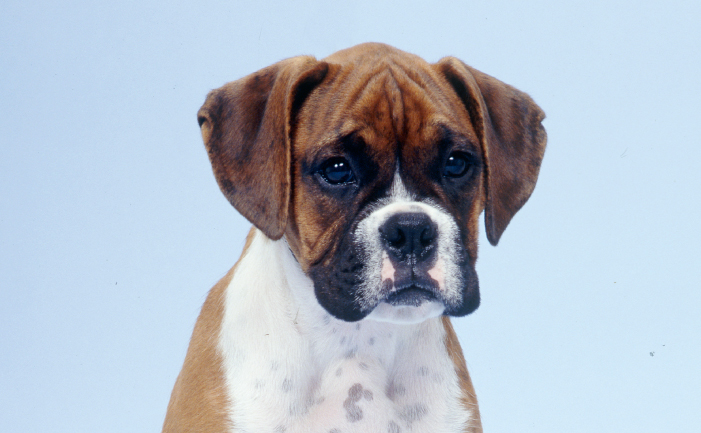
Breed: Boxer
Temperament: Active, can be excitable
Lifespan: 8-9 years
Recommended for: Families with older children
Maintenance: Low
The Boxer has long been one of Australia’s favourite pets, ranking in the top 10 most popular registered dogs for the past decade.
Appearance: The Boxer is the tallest of the brachycephalic breeds – dogs which are distinguished by their short faces such as Pugs and Bulldogs. They have a sleek, smooth coat in tones of red and brindle with white markings. They are a medium-sized dog, standing 53-63cm (21-25″) and weighing 25-32kg (66-70lb). The tail is docked and imported dogs may have their ears cropped to a point – an operation which is illegal in Australia.
Temperament: Boxers are said to be the eternal puppy, bouncy, outgoing and energetic. They adore attention and may become destructive or problem barkers if neglected. Breeders say they are protective of the family.
Health:
Cardiac disease has been estimated to affect up to 50% of Boxers. Our veterinary adviser, Dr Robert Zammit strongly recommends screening a puppy before purchase. If a murmur is detected, an ultrasound may be needed to clarify the problem. Most pets can live with minor problems but a few will be seriously affected. Clubs are working to breed out the problem. Cancerous tumours are common so any lumps or bumps detected should be shown to a vet immediately. Ulcerative colitis is a bowel condition which can occur at any age and causes chronic diarrhoea. It can be treated with cortisone. White Boxers are at risk of blindness, deafness and skin cancer.
Training: Breeders recommend new owners take their pup to obedience training. Boxers can be over-enthusiastic and headstrong and need firm, consistent discipline. Their playful attitude will not respond positively to harsh words, and patience will be needed with puppies.
Uses: Boxers in Australia are primarily companion dogs but have been used in the past by the German police force as guard dogs.
Ideal owner: Breeders recommend Boxers as good family dogs but Burke’s Backyard suggests children under 8-10 years may find the dogs too boisterous. They are ideally suited to a family of teenagers.
Grooming: This is a low maintenance breed with breeders recommending a weekly wipe over with a mitt and bathing as needed. Nails need to be clipped regularly.
Breeding: Breeders say Boxers do not have the severe difficulties giving birth that other brachycephalic breeds experience but caesareans do occur. About 6% of Boxers will be white, with a high chance the pup will be deaf, blind, or both, as well as a high risk of skin cancer. Responsible breeders will avoid mating two Boxers with a high proportion of white coat, and can minimise risk by using solid-coloured dogs. Litters average five puppies and it can take up to two years to reach maturity.
Space & exercise: A backyard with high fences is strongly recommended as some Boxers are excellent jumpers. A daily walk of 30 minutes is ideal.
Housepet potential: Boxers shed relatively little hair on furniture and enjoy being with the family. If excited they could be a danger to fragile ornaments!
History: The Boxer was developed in Germany from a type of dog known as the bullenbeisser (literally: bull-biter). Its ancestry may also include the Great Dane and English Bulldog. Either way, the Boxer has become a popular breed outside its homeland this century.
National contacts
To find up-to-date contacts for breeders, contact the following organisations.
The Australian National Kennel Council (ANKC)
www.ankc.org.au
Dogs NSW
http://www.dogsnsw.org.au/breeders-directory
Email: [email protected]
Phone: 1300 728 022 (NSW only) or (02) 9834 3022
Fax: (02) 9834 3872
Dogs Victoria
http://www.vca.org.au
Email: [email protected]
Phone: (03) 9788 2500
Fax: (03) 9788 2599
Dogs ACT
http://www.actca.asn.au
Email: [email protected]
Phone: (02) 6241 4404 – Fax: (02) 6241 1129.
Dogs West
http://www.cawa.asn.au
Email: [email protected]
Phone: (08) 9455 1188
Fax: (08) 9455 1190
Dogs SA
http://dogssa.com.au
Phone: (08) 8349 4797
Canine Control Council of Queensland
http://www.cccq.org.au
Email: [email protected]
Phone: (07) 3252 2661
Fax: (07) 3252 3864
Tasmanian Canine Association
http://www.tasdogs.com
Email: [email protected]
Phone: (03) 6272 9443
Fax: (03) 6273 0844
Dogs NT
http://www.territorydogworld.com
Email: [email protected]
Phone: (08) 8984 3570
Fax: (08) 8984 3409
The Australian National Kennel Council (ANKC)
www.ankc.org.au
Dogs NSW
http://www.dogsnsw.org.au/breeders-directory
Email: [email protected]
Phone: 1300 728 022 (NSW only) or (02) 9834 3022
Fax: (02) 9834 3872
Dogs Victoria
http://www.vca.org.au
Email: [email protected]
Phone: (03) 9788 2500
Fax: (03) 9788 2599
Dogs ACT
http://www.actca.asn.au
Email: [email protected]
Phone: (02) 6241 4404 – Fax: (02) 6241 1129.
Dogs West
http://www.cawa.asn.au
Email: [email protected]
Phone: (08) 9455 1188
Fax: (08) 9455 1190
Dogs SA
http://dogssa.com.au
Phone: (08) 8349 4797
Canine Control Council of Queensland
http://www.cccq.org.au
Email: [email protected]
Phone: (07) 3252 2661
Fax: (07) 3252 3864
Tasmanian Canine Association
http://www.tasdogs.com
Email: [email protected]
Phone: (03) 6272 9443
Fax: (03) 6273 0844
Dogs NT
http://www.territorydogworld.com
Email: [email protected]
Phone: (08) 8984 3570
Fax: (08) 8984 3409


